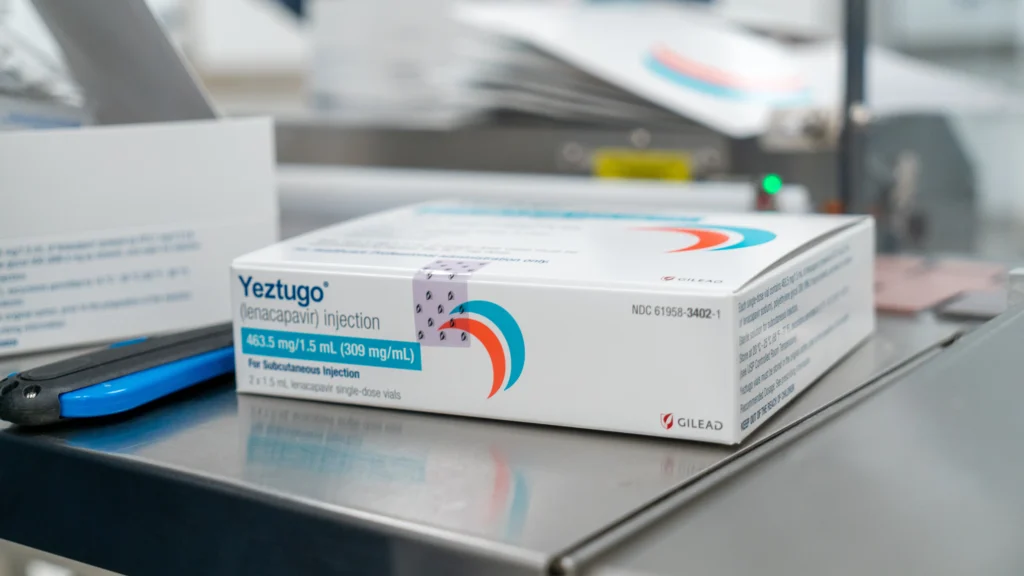In June 2025, the U.S. Food and Drug Administration (FDA) made a historic move by approving lenacapavir (brand name: Yeztugo) as the first HIV prevention drug that only needs to be taken twice a year. This landmark decision could potentially revolutionize the global fight against HIV, especially for high-risk populations who face challenges with daily adherence to oral pre-exposure prophylaxis (PrEP) pills.
For over four decades, scientists and public health professionals have struggled to find sustainable, accessible ways to prevent HIV transmission. While antiretroviral therapies (ARTs) have enabled people with HIV to live long, healthy lives, the goal has always been to stop new infections before they begin. Lenacapavir may be the most promising leap toward achieving that goal.
What is Lenacapavir (Yeztugo)?
Lenacapavir is a long-acting antiretroviral drug developed by Gilead Sciences. Originally approved in 2022 for treating individuals with HIV whose virus had become resistant to other medications, scientists quickly realized that lenacapavir’s unique pharmacological properties made it a strong candidate for HIV prevention as well.
Two key features make lenacapavir stand out:
- Extended half-life: Lenacapavir remains in the body for an extended period, allowing for biannual dosing.
- Multi-stage inhibition: It interferes with several steps in the HIV replication cycle, increasing its effectiveness.
These properties allow individuals at risk for HIV to receive a single injection every six months, eliminating the need for daily pills.
Efficacy in Clinical Trials
In two major clinical studies, Gilead demonstrated remarkable results:
- 100% efficacy in cisgender women.
- 96% efficacy in men who have sex with men and gender-diverse individuals.
These results far exceed those seen in many oral PrEP studies, where adherence can be a major issue. Lenacapavir’s long-acting nature ensures protection, even in populations with traditionally lower compliance rates.
How Lenacapavir Works
Unlike vaccines that train the immune system to fight off a virus, lenacapavir acts as a chemical barrier, circulating in the bloodstream and blocking HIV replication at multiple stages. Once injected, the drug binds to the HIV capsid protein, disrupting the virus's ability to assemble, transport, and integrate into human cells.
This makes lenacapavir especially effective not just in treating but preventing HIV before the virus even gets a foothold.
A Game-Changer for HIV Prevention Programs
One of the biggest hurdles in HIV prevention has been adherence. Daily PrEP pills, while effective, depend heavily on consistent usage. People who miss doses reduce the drug’s protective efficacy. Lenacapavir eliminates that issue with its twice-yearly schedule, making it far more convenient and reliable.
Organizations like the Global Fund to Fight HIV, TB, and Malaria are looking to scale up access to lenacapavir to reach their ambitious targets. With plans to get two million more people into prevention programs over the next three years, this biannual injection could be a critical tool.
Barriers to Global Adoption
Despite its scientific promise, lenacapavir faces several challenges:
- Accessibility: The injection must still be administered by a healthcare provider, and patients must test HIV-negative before each dose.
- Cost: Gilead hasn’t disclosed the exact pricing, but it’s expected to be in line with branded PrEP options, which could be prohibitively expensive for low-income countries.
- Infrastructure: Cuts to U.S. programs like PEPFAR and USAID jeopardize the global distribution network needed to deliver the drug at scale.
Gilead has negotiated royalty-free licenses with six generic manufacturers to supply lenacapavir to 120 low- and middle-income countries, but without strong public health systems, even free drugs can remain out of reach.

Impact on HIV Vaccine Development
Ironically, lenacapavir’s success could hinder future vaccine trials. With such high efficacy in a preventive drug, it may become ethically problematic to ask participants to receive a placebo in vaccine trials. According to Dr. David Ho, a pioneer in HIV research, "This might take a bit of the wind out of the sails of vaccine research."
Future Developments
Gilead is working on:
- A once-a-year version of lenacapavir.
- A self-administered injection to eliminate the need for clinic visits.
These upgrades could further streamline HIV prevention and reduce barriers to access.
Conclusion: A Powerful New Tool, But Not a Silver Bullet
Lenacapavir marks a significant advancement in HIV prevention, potentially reshaping the epidemic’s trajectory. However, without addressing systemic issues like cost, infrastructure, and healthcare access, this breakthrough may not reach those who need it most.
For lenacapavir to fulfill its promise, global health organizations, governments, and pharmaceutical companies must collaborate to ensure equitable access, especially in high-burden, low-resource settings.
